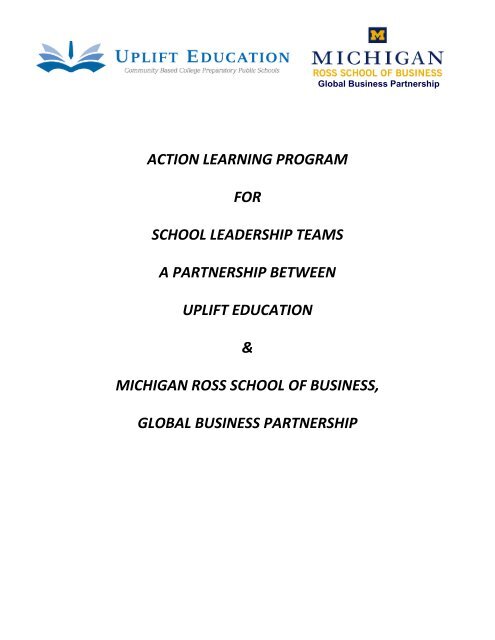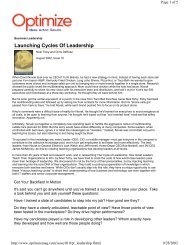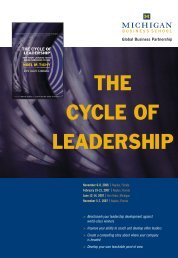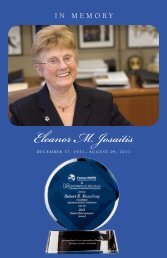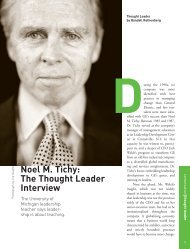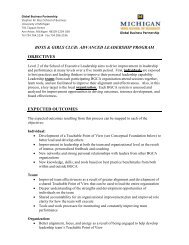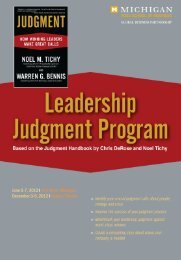Action learning program for school leadership teams a ... - Noel Tichy
Action learning program for school leadership teams a ... - Noel Tichy
Action learning program for school leadership teams a ... - Noel Tichy
- No tags were found...
You also want an ePaper? Increase the reach of your titles
YUMPU automatically turns print PDFs into web optimized ePapers that Google loves.
Global Business PartnershipACTION LEARNING PROGRAMFORSCHOOL LEADERSHIP TEAMSA PARTNERSHIP BETWEENUPLIFT EDUCATION&MICHIGAN ROSS SCHOOL OF BUSINESS,GLOBAL BUSINESS PARTNERSHIP
INTRODUCTION: ACTION LEARNING PROGRAM FOR UPLIFTThe University of Michigan’s Global Business Partnership will work together with UpliftEducation to develop a world class action <strong>learning</strong> based School Leadership DevelopmentProgram. The action <strong>learning</strong> process being proposed is similar to the one used by <strong>Noel</strong> <strong>Tichy</strong>over the last 30 years. <strong>Noel</strong> first developed the process at GE, then used it with many globalcompanies, as well as start‐ups in Silicon Valley, New York City School Principals, over 200 Boys& Girls Clubs nationally, and several hospital chains. The process entails working with six toeight <strong>teams</strong> of professionals at a time over a six‐month period. There is pre‐work with the<strong>school</strong> <strong>teams</strong> which is followed by a five‐day workshop, then back home application, a middlethree‐day workshop with follow up; and then at the end of the six months a three‐dayworkshop. The <strong>program</strong> is designed to simultaneously develop <strong>leadership</strong> capabilities whiledriving significant <strong>school</strong> per<strong>for</strong>mance improvement.OBJECTIVESThe <strong>Action</strong> Learning Program aims to drive improvement in <strong>leadership</strong> and per<strong>for</strong>mance atmany levels over a six‐month period. First, individuals are exposed to best practices andleading thinkers to improve their personal <strong>leadership</strong> capability. Leadership <strong>teams</strong> from eachparticipating Uplift campus attend sessions together, learn tools, and are facilitated to improvetheir alignment and effectiveness. Also in this process, a key target is the campus. Each Upliftcampus team will work on an improvement plan <strong>for</strong> its campus based on good diagnosis andgood strategy development.EXPECTED OUTCOMESThe expected outcomes resulting from this process can be mapped to each of the followingobjectives:Individual:• Development of a Teachable Point of View TM to better lead and develop others• Improvement in <strong>leadership</strong> at both the team and <strong>school</strong> level as the result of intense,personalized feedback and coaching• New networks and strong personal relationships with leaders from other Uplift <strong>school</strong>s• New knowledge, skills, and tools based on best practice benchmarks from both within andoutside Uplift
Organization:• Better alignment, focus, and energy as a result of being engaged to help develop<strong>leadership</strong> team’s Teachable Point of View TM• Improved focus on linking desired outcomes to specific activities of staff and keystakeholders• Better engagement of networks throughout the community <strong>for</strong> resource developmentDEVELOPMENT PROCESSThis is an action‐<strong>learning</strong> process in which everyone works on real problems, not case studies.Participants will refine their strategies and execution plans based on input from leading faculty,internal experts, and outside resources. Most important, Uplift campuses will learn from eachother through active peer coaching and best practice sharing.TRANSFORMATIONAL PROJECTThe process is based on the assumption that every Uplift campus has significant change andimprovement ef<strong>for</strong>ts already underway. This process builds upon those ef<strong>for</strong>ts by asking eachparticipating <strong>leadership</strong> team to frame a trans<strong>for</strong>mational project which will be significantlyexecuted during the course of this process. The project provides focus <strong>for</strong> the <strong>leadership</strong>team’s activities while participating in this process and ensures that they leave with tangibleaccomplishments. The project may be an entirely new initiative or may be the acceleration ofwork already underway.CONCEPTUAL FOUNDATIONThis <strong>program</strong> draws on Professor <strong>Tichy</strong>’s extensive practical experience applying the conceptsof action <strong>learning</strong>, leaders as teachers, and the building of virtuous teaching cycles. <strong>Tichy</strong>headed up the trans<strong>for</strong>mation of GE’s famed Leadership Development Center in Crotonville,New York. He and his team have worked with CEOs or leaders in the business, not‐<strong>for</strong>‐profit,educational, health care, and government sectors. Their work has developed <strong>leadership</strong>capacity around the world at institutions as diverse as New York City Public School System, Boysand Girls Clubs of America, major health care systems, Royal Dutch/Shell, and the US NavySEALS.A key component of this <strong>program</strong> is the recognition that adults learn best by working on realproblems, not case studies or hypothetical scenarios. <strong>Action</strong> <strong>learning</strong> enables leaders to workon problems that are of utmost importance to them while simultaneously being exposed tonew tools, concepts, and skills required to solve these challenges. The premise of action<strong>learning</strong> can be summed up as “1+1 = 4”. By combining a real project with individualdevelopment, team development, and organizational development, outcomes in all four areasare greater. Not only are project results achieved but individuals leave with more <strong>leadership</strong>
capabilities, <strong>teams</strong> are more efficient, organizational alignment has been enhanced, andnetworks across the organization have been created. A graphical representation of the sixmonthprocess is provided below.THE SIX‐MONTH ACTION LEARNING PROCESSLeadership developmentTeam developmentOrganization developmentStrategic planningSCHEDULE FOR 2010 ACTION LEADERSHIP PROGRAMForum 1: January 12‐16, 2010Forum 2: April 14‐16, 2010Forum 3: June 21‐23, 2010
WORKSHOP IThe first session is an exciting launch to the process. Individuals and <strong>teams</strong> are exposed toleading thinkers and are asked to develop action plans.An overview of the session is provided below.Tuesday Wednesday Thursday Friday Saturday• Opening –IntroJudgment &TeachablePoint of View• Current State:Hand YouHave BeenDealt (Self &Organization)• Strategy/IdeasFor EachSchool• Uplift Values• EmotionalEnergy – 360Feedback &Team Building• Team Mission& Objectives• EmotionalEnergy –LeadingChange &Execution• OperatingSystems <strong>for</strong>Schools• Edge –Judgment onPeople• Creating aCompellingVision• TeamActivity• Promoting aculture ofdata• ProjectPlanning• Being BoldandReceptive• ProjectPlanning• Team Contracts• DevelopingYour Storyline• Preparing toTeach YourOrganization
Workshop I outcomes include:Individual:• Development of a personalized action plan based on feedback collected be<strong>for</strong>e and during thesession• Clearer understanding of the role you play on this team, and how you will help to improve dailyoperations and project execution• Exposure to best practices and leading thinkers in the areas of <strong>leadership</strong>, outcome focus, boardeffectiveness, and resource developmentTeam:• A shared organizational diagnosis of priorities and development opportunities• A shared point of view that you can teach others across your organization• An action plan <strong>for</strong> improving aspects of your daily operations• An action plan <strong>for</strong> accomplishing your project work and first steps completedOrganization:• A methodology and content <strong>for</strong> teaching your entire organization that will drive betteralignment, share <strong>learning</strong>, and engage people in your mission and strategy• A plan <strong>for</strong> working with selected Board members to drive key organizational ef<strong>for</strong>ts, includingyour project• An initial diagnosis of potential untapped partners in your community
PREPARATION MATERIALS• The Hand You Have Been Dealt• 360 Feedback• Leadership Judgment Handbook
UPLIFT ACTION LEARNING PROGRAM360 FEEDBACKStep 1: Select a people or strategy judgment that you have made in the past year. It does not matterwhether or not the outcome of the judgment call can be decided definitively. You will assess yourselfand get feedback from others on your <strong>leadership</strong> role in making the call.a. What was the call?__________________________________________________________________________________________________________________________________________________________________________________________________________________________________________b. When was the call made?__________________________________________________________________________________________________________________________________________________________________________________________________________________________________________c. What have the results been so far?__________________________________________________________________________________________________________________________________________________________________________________________________________________________________________d. On a scale of 0‐10, how successful would you rate the call so far?0 1 2 3 4 5 6 7 8 9 10Completely Unsuccessful Mixed Results Very SuccessfulUnknownStep 2: Assess yourself at each stage of the call using the matrix below:Preparation Call ExecutionPositive – things I didwellAreas <strong>for</strong>ImprovementUse an additional sheet if required.
Step 3: Write a description of the judgment call above on page 4 below.UPLIFT ACTION LEARNING PROGRAM360 FEEDBACK(continued)Step 4: Write in the date on page 3 by which you need the feedback returned to you.Remember, you will need your feedback on the first day of the <strong>program</strong> so it should be returned toyou with ample time.Step 5: Select 4 to 6 people who were involved with the judgment.Step 6: Make copies and distribute pages 3‐5 to each person you selected in Step 5. Give them theinstruction sheet below and ask them to return their feedback to you in a sealed envelope.
UPLIFT ACTION LEARNING PROGRAMINSTRUCTION SHEET TO RESPONDENTYou have been selected by a colleague to provide feedback on their Leadership Judgment capability <strong>for</strong>use in the Uplift <strong>Action</strong> Learning Program. You have been selected because you participated in or wereimpacted by a judgment call that the leader recently made. S/ he would like your candid, constructivefeedback to improve their <strong>leadership</strong> capability. Please take a few moments to consider the qualities ofgood judgment and input you can provide to help your colleague become a better leader.Your FeedbackThere are 2 parts to your feedback.Step 1: On the attached sheet, your colleague has asked you to provide feedback on a specific judgmentcall that he or she made recently. Please use the <strong>for</strong>m to identify things the individual did well or areas<strong>for</strong> improvement specifically related to that judgment call.Step 2: Use the remaining space to provide more general feedback on behaviors that would help theindividual be a better leader. Identify specific behaviors the leader can do more of, less of, andcontinue.Please return your feedback in a sealed envelope by ____________________.Your colleague will use your feedback on the first day of the <strong>program</strong>.Why Judgment is ImportantThe essence of <strong>leadership</strong> is judgment. The single most important thing that leaders do is make goodjudgment calls. In the face of ambiguity, uncertainty, and conflicting demands, often under great timepressure, leaders must make decisions and take effective actions to assure the survival and success oftheir organizations. Good leaders not only make better calls, but they are able to discern the reallyimportant ones and get a higher percentage of them right.Judgment is a ProcessMany times people think of judgment as the moment someone makes a decision. In fact, <strong>leadership</strong>judgment must be viewed as a process. There are three phases:1. Preparation: Sensing and identifying the need <strong>for</strong> a judgment call, framing and naming the call, andmobilizing and aligning the right people.2. Making the Call: Determining when there is sufficient in<strong>for</strong>mation given the time horizon to make thecall. The call must be communicated clearly.3. Execution: Following up to provide resources and keep people mobilized to support the call.Good judgment is based on getting desired results, no matter how intellectually sound the original callmay be. Throughout these phases, leaders constantly revisit their judgments to adjust and improvethem. These are redo loops where the call can be changed or reversed based on changingcircumstances, better in<strong>for</strong>mation, or feedback from action.
UPLIFT ACTION LEARNING PROGRAMFEEDBACK FORMThe CallYour colleague would like feedback on the judgment call below. She or he has provided the in<strong>for</strong>mationbelow.a. What was the call?__________________________________________________________________________________________________________________________________________________________________________________________________________________________________________b. When was the call made?__________________________________________________________________________________________________________________________________________________________________________________________________________________________________________Your Assessmentc. What have the results been so far?__________________________________________________________________________________________________________________________________________________________________________________________________________________________________________d. On a scale of 0‐10, how successful would you rate the call so far?0 1 2 3 4 5 6 7 8 9 10Completely Unsuccessful Mixed Results VerySuccessfulUnknownPositive – things mycolleague did wellPreparation Call ExecutionAreas <strong>for</strong>ImprovementUse an additional sheet if you have more comments.
UPLIFT ACTION LEARNING PROGRAMFEEDBACK FORMPlease use the space below to provide feedback to your colleague on their overall <strong>leadership</strong>behaviors.Please be as specific as possible about behaviors that would help this individual improveper<strong>for</strong>mance and represent the core values of the company.Feedback <strong>for</strong>: ______________________________________________________Specific behaviors to do more of:Specific behaviors to do less of:Specific behaviors to continue:


